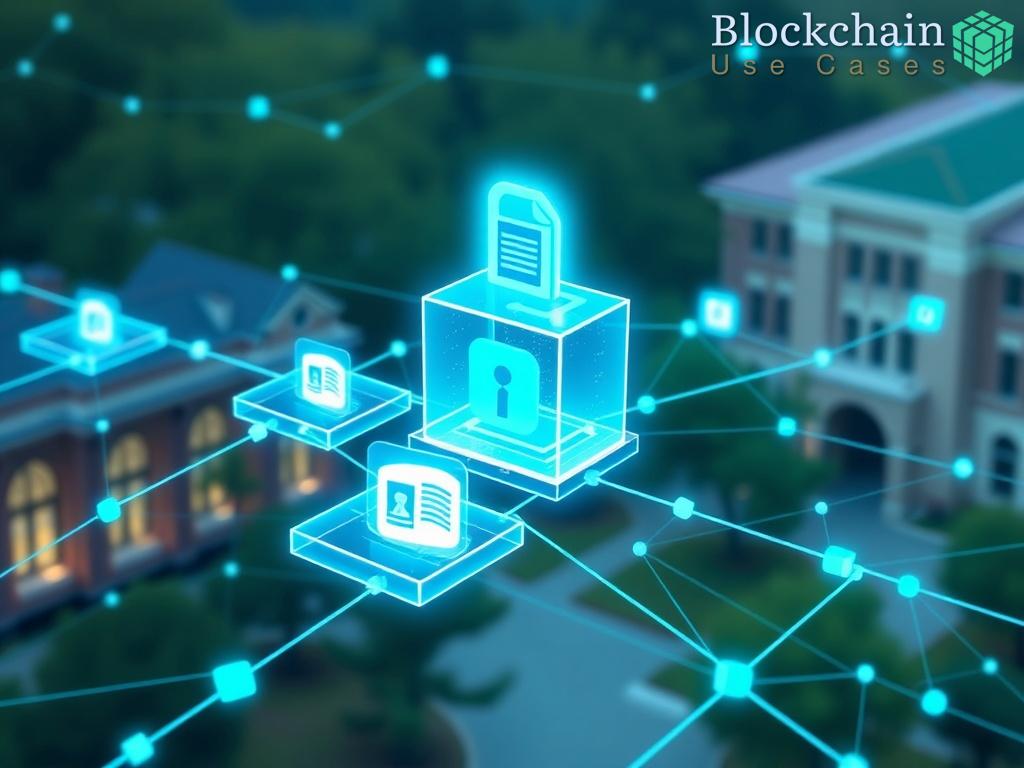Overview of Blockchain Technology in Education
In an era where data integrity and security are paramount, blockchain technology emerges as a transformative force within the educational sector. The advent of decentralized ledger systems provides a robust framework for managing sensitive information related to student immigration and visa statuses. This paradigm shift not only enhances transparency but also reassures stakeholders about the reliability of educational records.
Implementing blockchain technology in the education sector offers several compelling advantages. Educational institutions can leverage this innovation to streamline processes, ensure data immutability, and foster trust among students, faculty, and regulatory bodies.
- Enhanced Security: Blockchain’s decentralized nature significantly reduces the risk of unauthorized access to sensitive student records.
- Improved Transparency: All transactions are recorded on a public ledger, allowing for real-time auditing and verification of records.
- Efficiency in Record Management: Automated processes reduce administrative burdens, enabling institutions to focus on core educational functions.
To understand the profound impact of blockchain technology, it is crucial to compare it with traditional record-keeping methods. Below is a table outlining the differences:
| Aspect | Traditional Systems | Blockchain Systems |
|---|---|---|
| Data Storage | Centralized servers | Decentralized distributed ledger |
| Data Integrity | Vulnerable to tampering | Immutable records |
| Access Control | Limited to authorized personnel | Permissioned access with transparency |
| Cost Efficiency | Higher operational costs | Reduced administrative costs |
As illustrated above, blockchain technology provides a more secure and efficient alternative for managing student immigration and visa status records, making it an ideal choice for educational institutions aiming to enhance their operational frameworks.
Enhancing Data Security for Visa Status Records
In an increasingly interconnected world, the security of student immigration and visa status records has become a pressing concern for educational institutions. With traditional systems often susceptible to breaches and data manipulation, blockchain technology stands out as a formidable solution. This decentralized ledger system not only protects sensitive information but also enhances trust among stakeholders, ensuring that data integrity is maintained at all levels.
The fundamental strength of blockchain lies in its ability to create tamper-proof records. Every transaction related to student immigration and visa statuses is securely encrypted and stored across a network of computers, making unauthorized alterations nearly impossible. Unlike conventional databases that can be easily breached, blockchain offers a resilient framework that significantly mitigates the risk of data corruption.
Another pivotal advantage of utilizing blockchain technology for managing visa status records is the capability for real-time monitoring. Educational institutions can access updated visa status information instantaneously, allowing for proactive compliance with immigration regulations. This real-time access not only facilitates timely interventions when issues arise but also aids in maintaining up-to-date records for audits and inspections.
Below is a summary of the primary benefits that blockchain technology brings to the management of student visa status records:
- Decentralization: Reduces the risk of single points of failure.
- Transparency: All stakeholders can verify records, fostering trust.
- Enhanced Security: Advanced encryption techniques safeguard sensitive data.
- Cost-Effective: Minimizes administrative overheads associated with record management.
By embracing blockchain technology, educational institutions not only enhance the security of student immigration and visa status records but also align themselves with future-forward practices that prioritize data integrity and stakeholder trust.
Streamlining Immigration Processes through Decentralization
As educational institutions grapple with the complexities of immigration processes, the need for a more efficient and secure framework is evident. Blockchain technology emerges as a beacon of hope, offering a decentralized approach that fundamentally alters how student immigration and visa status records are managed. By leveraging the power of distributed ledger systems, institutions can not only secure sensitive information but also enhance the overall efficiency of their immigration processes.
The decentralized nature of blockchain eliminates the reliance on a single point of control, which is often a vulnerability in traditional systems. In this innovative framework, data is distributed across a network of nodes, making it nearly impossible for unauthorized users to alter or compromise sensitive records. This inherent security feature significantly reduces the risk of fraud, ensuring that only verified stakeholders have access to critical information regarding student immigration statuses.
One of the standout features of blockchain technology is its ability to foster seamless communication among various stakeholders involved in the immigration process. Educational institutions, government agencies, and students can all access the same up-to-date information in real-time. This transparency not only enhances collaboration but also expedites decision-making processes. For instance, when a student’s visa status changes, all relevant parties can be notified instantaneously, allowing for timely interventions and compliance with immigration regulations.
Moreover, the automated nature of blockchain transactions streamlines administrative tasks, reducing the time and resources spent on manual data entry and verification. By automating these processes, educational institutions can redirect their focus towards enhancing student services and educational quality, rather than getting bogged down in bureaucratic inefficiencies.
Trust is a cornerstone of effective immigration management, and blockchain technology plays a pivotal role in fostering this trust among all parties involved. With every transaction recorded on an immutable ledger, stakeholders can verify the authenticity of records without the need for intermediaries. This level of transparency is particularly crucial in an environment where data integrity is often questioned.
Furthermore, the auditability of blockchain systems enhances accountability. Each action taken regarding a student’s visa status is documented and can be traced back to its origin. Such traceability not only simplifies compliance with regulatory requirements but also provides a clear framework for addressing any disputes or discrepancies that may arise. In an age where the consequences of immigration issues can be dire, this capability is invaluable.
Implications of Smart Contracts on Student Visa Management
In the evolving landscape of student immigration and visa management, the integration of smart contracts represents a significant leap towards efficiency and reliability. These self-executing contracts, with the terms of the agreement directly written into code, can automate various processes, ensuring that all parties adhere to the stipulated conditions without the need for intermediaries. This innovation not only streamlines operations but also enhances the security and transparency of visa management systems.
Automating Compliance and Reducing Administrative Burdens
One of the most compelling implications of smart contracts is their ability to automate compliance with immigration regulations. By embedding the requirements of visa statuses within the smart contract, educational institutions can ensure that any changes in a student’s status trigger automatic notifications to relevant stakeholders. This capability reduces the risk of human error and ensures that institutions remain compliant with regulatory demands. Moreover, the automation of routine administrative tasks allows institutions to reallocate resources towards enhancing educational services, thereby improving overall student experiences.
Enhancing Transparency and Trust Among Stakeholders
The deployment of smart contracts significantly enhances the level of transparency in the visa management process. Each contract is recorded on a blockchain, providing a permanent and immutable record of all transactions. This transparency fosters greater trust among students, educational institutions, and regulatory bodies. By allowing all parties to view the same data in real-time, smart contracts mitigate the potential for disputes and misunderstandings regarding visa statuses. Furthermore, this level of openness is instrumental in creating a collaborative environment where stakeholders can work together seamlessly to address any issues that arise.
Facilitating Real-Time Data Access and Decision Making
Smart contracts also play a crucial role in ensuring that data is accessible in real-time, enabling quick decision-making processes in response to changes in a student’s visa status. In scenarios where swift action is necessary—such as addressing potential violations or compliance issues—having immediate access to up-to-date information can significantly impact outcomes. Educational institutions can leverage this capability to proactively manage their students’ immigration needs, minimizing the risk of lapses that could lead to serious consequences for both the institution and the student.
Challenges and Solutions in Implementing Blockchain for Immigration
The integration of blockchain technology into the management of student immigration and visa status records presents numerous opportunities for enhanced security and efficiency. However, the journey towards implementation is not without its hurdles. Institutions must navigate a landscape rife with technical, regulatory, and cultural challenges while ensuring that the promise of blockchain is fully realized. Understanding these challenges and exploring viable solutions is essential for educational institutions aiming to adopt this innovative technology.
One of the foremost challenges in implementing blockchain for immigration management lies in the technical complexities associated with system integration. Existing records and databases often operate on legacy systems that can be incompatible with new blockchain solutions. This dissonance can lead to significant disruptions during the transition phase. Moreover, the intricacies of blockchain technology itself, including consensus algorithms and smart contract implementations, require specialized expertise that many institutions may not possess.
To address these technical hurdles, educational institutions can invest in collaborative partnerships with technology providers who specialize in blockchain solutions. By leveraging the expertise of these partners, institutions can facilitate a smoother transition and ensure that integration processes are optimized. Additionally, conducting comprehensive training programs for staff will build internal capabilities, empowering teams to manage and operate blockchain systems effectively.
As institutions explore the deployment of blockchain technology, regulatory compliance emerges as a critical concern. The decentralized nature of blockchain can create uncertainties regarding data ownership and privacy, particularly in jurisdictions with stringent data protection laws. Institutions must align blockchain practices with existing regulations governing student records and immigration data, which can be complex and time-consuming.
To overcome these regulatory challenges, institutions should engage in proactive dialogue with regulatory bodies. By participating in discussions and contributing to the development of guidelines tailored for blockchain technology, educational institutions can advocate for regulations that accommodate innovation while safeguarding student data. Furthermore, building robust privacy measures within blockchain implementations—such as data encryption and permissioned access—can help ensure compliance with data protection standards.
As educational institutions embark on the journey to implement blockchain for managing student immigration and visa status records, they must remain vigilant in addressing the challenges that arise. By fostering collaborations with technology partners and engaging with regulatory bodies, institutions can pave the way for a secure, efficient, and transparent immigration management system that benefits all stakeholders involved.





